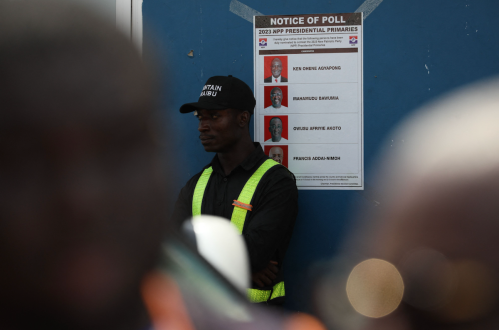Content from the Brookings Doha Center is now archived. In September 2021, after 14 years of impactful partnership, Brookings and the Brookings Doha Center announced that they were ending their affiliation. The Brookings Doha Center is now the Middle East Council on Global Affairs, a separate public policy institution based in Qatar.
As a leading civil society actor and mobilizer of youth activists, the Al Khatim Adlan Center for Enlightenment (KACE) is working to capitalize on the surge of popular support for democracy and human rights in Sudan by developing a multi-track, regionally focused, and domestically led transitional justice process.
Not only should justice tools take into account the scope and impact of the crimes committed against individuals in a particular region, but they should also address the victimization of entire communities. Survivors, victims’ families, civil society, and human rights organizations—all of their voices are needed to ensure the credibility of a justice process. These stakeholders must be involved from the start to inform regional initiatives and gain ownership of the process, as they can best speak to community-specific abuses and aspirations for the future.
As many observers of justice-related issues in Sudan know, the International Criminal Court (ICC) has played a significant role in attempts to seek accountability for crimes committed during the Darfur conflict that began in 2003. Ali Kushayb, a former senior commander of the Janjaweed militias in Sudan, was arrested and transferred to ICC custody in June 2020. The ICC had issued his arrest warrant thirteen years earlier, in 2007, for war crimes and crimes against humanity allegedly committed in Darfur. Ousted Sudanese president, Omar al-Bashir, was also indicted by the ICC for genocide, crimes against humanity, and war crimes; however, he was put on trial over corruption charges in the capital Khartoum soon after his ouster in April 2019.
While Kushayb’s transfer to the Hague is an important step in pursuing justice and accountability on the international stage, questions remain about the broader justice process in Sudan. As the transitional government works with the ICC to coordinate future trials, it is important to remember that lasting change requires Sudan to go beyond international prosecutions, seizing upon the current political and social moment at home to catalyze institutional reform. As such, KACE is building a civil society coalition to implement a strategy that addresses Sudan’s complex history of violence, starting from independence in 1956 and culminating in the present revolution.
Reckoning with a history of violence and injustice
Al-Bashir’s three decades of rule were characterized by mass violence, especially against marginalized groups. From a civil war between 1983 and 2005 that claimed the lives of more than two million people and forcibly displaced millions more, to the atrocities committed in the 2003 Darfur conflict, to the 2011 conflict in South Kordofan’s Nuba Mountains and Blue Nile, the Sudanese people have experienced tremendous loss. Throughout the country’s multiple conflicts and transitions, persecution was a daily reality. The National Intelligence and Security Services (NISS) dealt with political dissenters violently and with impunity, enabling arbitrary detentions, extra-judicial killings, torture, and other gross human rights violations.
Sudanese youth, though, have provided hope by engaging in demonstrations and activism, putting an end to the reign of al-Bashir and his National Congress Party (NCP). The current civilian-led transitional government in Sudan has the potential to hold strong institutions and authorities accountable, enabling structural change and a societal reckoning with the past. The transitional government has already engaged with civil society and the ICC; begun implementing demanded reforms; and worked to draft the law governing the eventual national transitional justice commission. The government has also established investigation committees for crimes committed during the 2019 demonstrations and sit-ins. Many Sudanese have insisted, in particular, on justice for the victims of the June 3rdmassacre, during which over 120 individuals were killed and hundreds more injured.
A call for regional, multi-track transitional justice processes in Sudan
KACE’s strategy for a transitional justice process deploys a variety of regionally tailored mechanisms, including prosecutions, compensation, truth commissions, reconciliation initiatives, and memorials. Work has already begun in several of these areas—murals have been painted throughout the country to preserve memories and prosecutions have begun to take place. The range of justice mechanisms, when combined over time, is meant to provide comprehensive, institutional reform. This is a vital step to restore trust in institutions, from the judiciary to the police, and to ensure that rights violations are no longer tolerated. Just as important is the restoration of victims’ dignity as equal citizens and human beings through confessions and memorials, as well as the restoration of victims’ humanity through psychosocial reparations and response.
Ultimately, the goal of Sudan’s transitional justice process is to resemble the very revolution by which it was inspired: led by Sudanese youth and civil society and attentive to the complex and layered nature of victimization in the country. As the revolution continues to unfold, so too will the transitional justice process, adapting and conforming to community needs and government responses, while allowing the Sudanese people to take confident strides into a more just and peaceful future.
The Brookings Institution is committed to quality, independence, and impact.
We are supported by a diverse array of funders. In line with our values and policies, each Brookings publication represents the sole views of its author(s).




Commentary
Op-edSudan needs a region-focused, multi-track transitional justice process
November 24, 2020